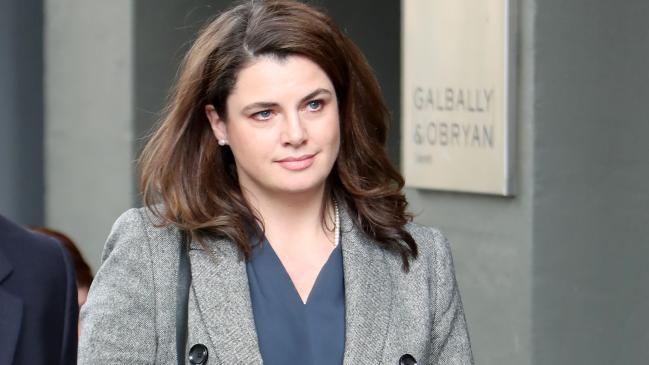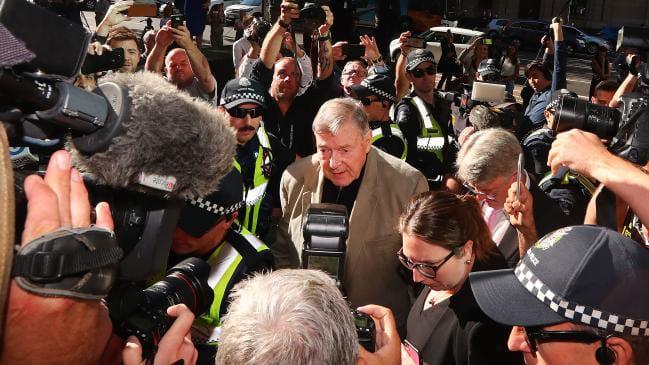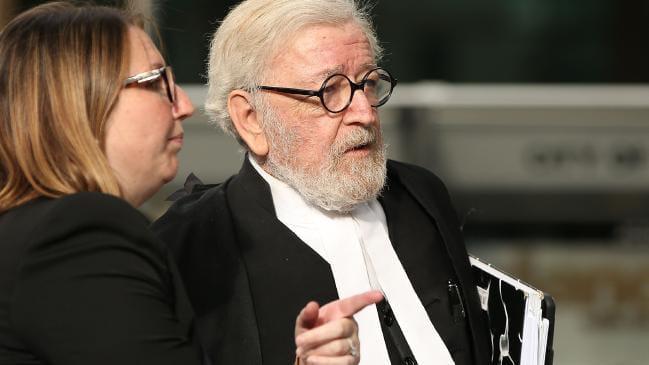|
Why the complainant in George Pell’s trial was so compelling
By Charis Chang
News.Com.AU
February 27, 2019
https://bit.ly/2tHKuy9
 |
| Author Louise Milligan leaves after testifying in the committal hearing for Cardinal George Pell, at the Magistrates Court in Melbourne. Picture: Stuart McEvoy for The Australian. |
 |
George Pell arrives at Melbourne County Court on February 27.
Photo by Michael Dodge |
 |
Pell’s lawyer Robert Richter QC arrives at County Court on February 26, 2019 in Melbourne.
Photo by Michael Dodge |
[with video]
Many people can’t believe Cardinal George Pell is guilty of child sex offences but it was this key piece of evidence that sealed his fate.
It’s shocking, it’s incomprehensible and to some, it’s unbelievable.
Cardinal George Pell, a man who rose to become, not just Australia’s most senior Catholic, but one of the most powerful men in the Vatican, had been found to be a paedophile.
When the news broke yesterday that Pell was found guilty in December of child sex offences, many expressed disbelief but others just couldn’t accept the verdict.
In an opinion piece, Herald Sun columnist Andrew Bolt said he believed Pell had been “falsely convicted”. The Daily Telegraphcolumnist Miranda Devine also said: “I don’t believe that Pell, who I know slightly and admire greatly, could be guilty of assaulting two choirboys in a busy cathedral.”
Yesterday, the 77-year-old disgraced cardinal was taken into custody and spent his first night behind bars before being sentenced on March 13. However, his legal team is pushing for a retrial and intend to appeal his child sex convictions with the Court of Appeal.
Speaking on his Sky News show on Tuesday night, Bolt said he had “serious misgivings” about Pell’s guilty verdict.
“I just can’t accept it, based on what I consider is the overwhelming evidence of this trial,” he said. “And I base that opinion also on how many times Pell has been accused of crimes and sins he clearly did not do.
“Pell could well be an innocent man who is being made to pay for the sins of his church and made to pay after an astonishing campaign of media vilification.”
ABC investigative journalist Louise Milligan is one of the few people in Australia who knows the identity of Pell’s complainant. She tracked him down while researching her book Cardinal: The Rise and Fall of George Pell, for which she won a Walkley Book Award.
She acknowledged on 7.30 on Tuesday night there had been a “lot of doubters” about the case but something she’s always said to people through the years was: “I defy anyone to meet this man and not think that he is telling the truth.
“He has absolutely nothing to gain from this and everything to lose.”
In her book Milligan calls Pell’s complainant The Kid and described him as an ideal witness from a police point of view.
“The Kid has not led a chequered life,” Milligan notes in her book. “He’s university-educated, he hasn’t had trouble with the law. He has a lovely young girlfriend, lots of friends, he’s a pillar of his community in a sort of understated, slightly ironic way, and in that part of his life, he is, he told me, very happy.
“He’s managed, just, to keep it together. He’s been able to compartmentalise. He’s the sort of complainant you’d want as a Victoria Police detective alleging historic crime.”
‘YOU’RE IN TROUBLE’
Both Bolt and Devine have pointed to the improbability of the scenario put forward in court.
The two boys were abused by Pell after he found them in the sacristy, a room used by priests to get dressed, where they were swigging sacramental wine after a Sunday Mass.
“(Pell) planted himself in the doorway and said something like, ‘What are you doing here’ or ‘You’re in trouble’,” the complainant told the jury.
The court heard one of the boys asked: “Can you let us go? We didn’t do anything.”
But instead, the then-archbishop of Melbourne pulled one of the boys aside and pushed his head down to his penis.
After a few minutes, he turned his attention to the other choirboy, and forced him to perform oral sex before fondling him as he masturbated.
The former choirboy told the jury the ordeal lasted just a few minutes but a few months later he was abused by Pell on a second occasion.
Both Bolt and Devine point out the attack is meant to have happened after Mass, when Pell would usually have spent time speaking to worshippers and that it happened in the sacristy, which is a busy room that someone could have walked into.
They also note Pell was normally accompanied everywhere he went by the master of ceremonies, Monsignor Charles Portelli. Their views echo an article written by Father Frank Brennan who also pointed out his concerns with some of the evidence presented.
“Anyone familiar with the conduct of a solemn Cathedral Mass with full choir would find it most unlikely that a bishop would, without grave reason, leave a recessional procession and retreat to the sacristy unaccompanied,” he wrote in Eureka Street.
He also noted that the priest’s garments could not have been pushed aside in the way described and it was “impossible to produce an erect penis through a seamless alb”.
An alb is a long robe which is worn with a belt called a cincture. It doesn’t have any zippers or buttons but has small slits on the side to allow access to trouser pockets underneath. It is worn underneath an ornate vestment called a chasuble.
“The complainant’s initial claim to police was that Pell had parted his vestments, but an alb cannot be parted; it is like a seamless dress,” Father Brennan wrote.
“Later the complainant said that Pell moved the vestments to the side. An alb secured with a cincture cannot be moved to the side.
“The police never inspected the vestments during their investigations, nor did the prosecution show that the vestments could be parted or moved to the side as the complainant had alleged.”
Father Brenann said the idea that the offences were committed right after Mass by a fully robbed archbishop in the sacristy with an open door and in full view of the corridor “seemed incredible to my mind”.
‘THEY MUST HAVE BELIEVED HIM’
However, Pell’s complainant was cross-examined for more than a day by defence barrister Robert Richter QC, who is known for being one of the best in the business. He’s defended Melbourne gangland figure Mick Gatto and Hoddle Street massacre shooter Julian Knight.
If there were holes in the complainant’s story Richter would have found them and attacked them vigorously.
The public have not been allowed to see the complainant’s testimony but it was the key piece of evidence that decided the case.
The complainant did not appear in person at the trial but footage of his testimony and cross-examination from an earlier trial, which resulted in a hung jury, was shown instead.
“Although the complainant got all sorts of facts wrong, the jury must have believed that Pell did something dreadful to him,” Father Brennan acknowledged in his article.
“The jurors must have judged the complainant to be honest and reliable even though many of the details he gave were improbable if not impossible.”
THE KID AND THE CHOIRBOY
Author Louise Milligan said the complainant decided to come forward after the death his friend (referred to as The Choirboy in her book).
Unlike The Kid, who managed to compartmentalise the trauma and went on to lead a somewhat normal life, his friend The Choirboy spiralled out of control like so many others who have experienced abuse at a young age.
The Kid and The Choirboy both got choral scholarships to the exclusive St Kevin’s College because of their beautiful singing voices and they became friends.
Milligan interviewed the mother of The Choirboy, who described a sudden change in her son when he was 13 or 14 years old. Soon after he began dabbling in heroin and struggled with addiction for about 15 years.
In 2014 he died of a heroin overdose when he was 30 years old.
The Kid attended his friend’s funeral and a few months later The Choirboy’s mother Mary got a call from Victoria Police wanting to know if her son had ever mentioned a sexual assault.
Something clicked. Mary had twice asked her son if he had been a victim of abuse — something just didn’t feel right about her son’s behaviour — but he had always denied it.
After years of keeping the secret, never discussing it, even with his friend, The Kid decided he had to come forward, for himself and for The Choirboy.
“The Kid told Mary that her son’s funeral was the breaking point for him. It was plunged him into despair and regret,” Milligan’s book said.
Mary believes The Kid’s story and can’t imagine what he has to gain by coming forward.
Somehow, The Kid’s story also got through to those 12 jurors at Melbourne’s Victorian County Court. They were some of the few people who have heard his testimony and despite the odds stacked up against it, they believed him.
|


